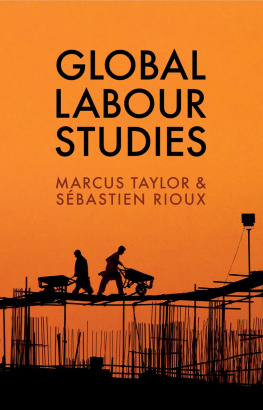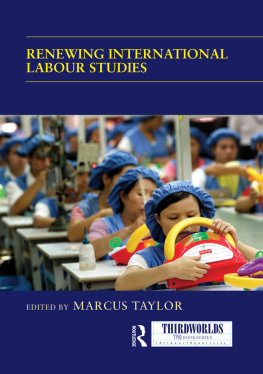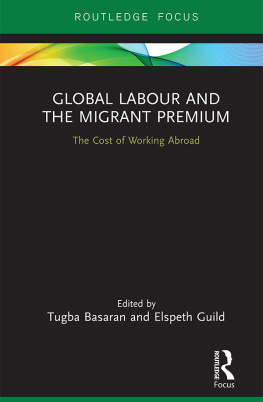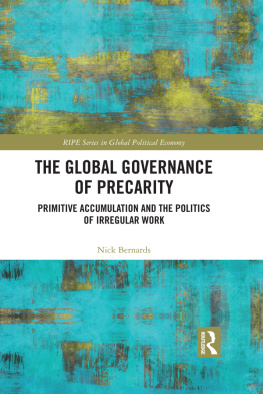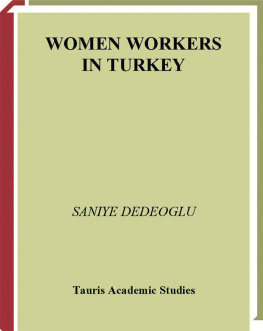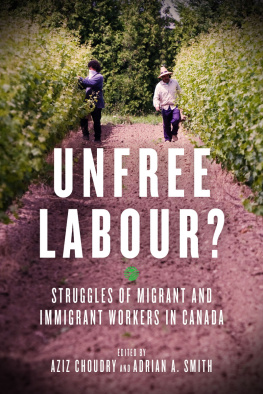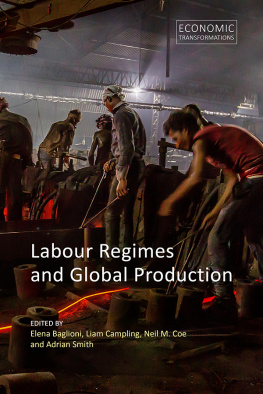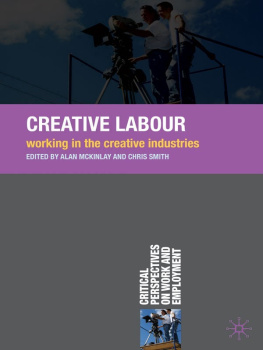Contents
Guide
Pages

Work & Society Series
Thomas Janoski, David Luke & Christopher Oliver, The Causes of Structural Unemployment: Four Factors that Keep People from the Jobs They Deserve
Karyn Loscocco, Race and Work: Persistent Inequality
Cynthia L. Negrey, Work Time: Conflict, Control, and Change
Marcus Taylor & Sbastien Rioux, Global Labour Studies
GLOBAL LABOUR STUDIES
Marcus Taylor and Sbastien Rioux
polity
Copyright Marcus Taylor and Sbastien Rioux 2018
The right of Marcus Taylor and Sbastien Rioux to be identified as Authors of this Work has been asserted in accordance with the UK Copyright, Designs and Patents Act 1988.
First published in 2018 by Polity Press
Polity Press
65 Bridge Street
Cambridge CB2 1UR, UK
Polity Press
101 Station Landing Suite 300
Medford, MA 02155 USA
All rights reserved. Except for the quotation of short passages for the purpose of criticism and review, no part of this publication may be reproduced, stored in a retrieval system or transmitted, in any form or by any means, electronic, mechanical, photocopying, recording or otherwise, without the prior permission of the publisher.
ISBN-13: 978-1-5095-0410-7
A catalogue record for this book is available from the British Library.
The publisher has used its best endeavours to ensure that the URLs for external websites referred to in this book are correct and active at the time of going to press. However, the publisher has no responsibility for the websites and can make no guarantee that a site will remain live or that the content is or will remain appropriate.
Every effort has been made to trace all copyright holders, but if any have been inadvertently overlooked the publisher will be pleased to include any necessary credits in any subsequent reprint or edition.
For further information on Polity, visit our website: politybooks.com
Acknowledgements
Our greatest intellectual debt goes to labour scholars who, through research, fieldwork and theoretical and conceptual developments, have shaped global labour studies. Amy Williams and Jonathan Skerrett from Polity deserve special thanks for their commitment, help and support throughout the project. We also acknowledge the contribution of two anonymous reviewers who provided us with positive and constructive criticisms. At a more personal level, we thank Susanne Soederberg and Sibel Ataogul for their profound help and support. Nicholas Bernards and Josh Travers kindly provided useful feedback on sample chapters.
Chapter 1
Introduction: Thinking Global Labour Studies
Its a slightly chilly late September day and we are sitting in a caf in downtown Montreal. While chatting and occasionally typing on our laptops, we each sip a cup of steaming black tea. This moment of consumption appears as an isolated act, something we might do on a daily basis without giving it a passing thought. For our part, we simply chose from an extensive list of excellent teas, paid the cashier and thanked the server when the hot mugs arrived at our table. Our actions, it seemed, were localized. After all, they took place in a small corner of a caf in a backstreet of Montreal. And yet, through the simple activity of buying tea we are immediately yet unknowingly inserted as one nodal point within a dense web of productive activities that link thousands of people across continents. Although the leaves in our cups are predictably silent about their path from production to consumption, it turns out that they were grown in the Sri Lankan highlands half a world away. If you run a quick Google search, youll see that these tea plantations have a rather idyllic appearance, with lush green foliage flowing down across picturesque hillside terraces. Owing to humid subtropical temperatures and a fertile soil that is amply watered by seasonal monsoons, the region provides excellent conditions for cultivating Camellia sinensis, the bush from which all tea is produced. This was certainly the impression of the nineteenth-century British colonial authorities who imported tea plants from China and conscripted thousands of indentured labourers from India to start the first commercial tea operations in Ceylon, now the nation of Sri Lanka. Fastforwarding 150 years, these plantations have risen to become one of the biggest tea exporting sites in the world.
Putting the serene vistas of the Sri Lankan terraces to one side, we can start to map out the complex network of labouring relationships that collectively turn the leaves of a hillside shrub into a marketable commodity distributed to consumers via shops and restaurants many thousands of miles away. Tea, of course, is not an unduly complex commodity, yet the sheer variety of actors involved in this process is notable: from female tea pickers on the plantations, to various workers in the local companies where the tea is dried and processed into teabags, through to managers in international corporations that buy the bulk tea and market it to stores globally. Together, these agents each with different roles, interests and degrees of power have collectively shaped the journey of tea through its sequential stages of production, distribution and consumption. In so doing, they form part of a chain of lives and livelihoods that spills over a vast geographical terrain, stretching from the terraces of Sri Lanka to an unassuming caf on another continent. Importantly, each actor has an unequal ability to shape the conditions under which they participate in the network. This affects not only the relative gains such as wages or profits that they accrue, but also the type and level of risks they face from their participation.
The tea leaves swilling in our cups, for example, are picked by a predominantly female workforce that is descended from Tamil indentured labourers imported by the British well over a century ago. These workers have spent generations assiduously labouring for poor pay and under arduous working conditions on the terraced hillsides. While tea picking is largely portrayed as womens work, men from the local villages typically look for jobs in the processing companies that transform the raw leaves into finished teabags. Despite their long hours, jobs on the processing side tend to be slightly better paid and have less punishing working conditions in comparison to the pickers. These inequities indicate how the division of labour in the tea industry is highly gendered. Women disproportionately occupy lower paid, more arduous and less secure tasks and, as a result, experience a strong degree of marginalization with very little power to challenge their conditions of work or pay. Although they actively seek to improve conditions for themselves whenever possible, many women tea workers strive to ensure that their children gain sufficient educational achievements to pursue other paths of work, far away from the plantations on which they themselves often feel trapped.
The production of tea, of course, does not begin and end upon the terraces. It is filtered through the regulatory structures and political power of firms, states and other organizations, each of which exerts its own influence on how tea is made, including the conditions of workers at the foot of the industry. Although the lowly status of pickers is contested by the activities of workers and supportive nongovernmental organizations (NGOs) that seek to improve conditions within the sector, both plantation owners and processers have often been resistant to such initiatives. Noting the strong international competition in the tea industry with rival plantations in Assam, Fujian and other parts of Asia they decry the potential adverse impacts on profitability that substantive wage rises would entail. The plantations themselves form the lowest link in a chain of companies headed by retailing corporations that market the tea internationally. The tea processors occupy a middle tier: buying leaves from the plantations before selling the processed product onwards to the retailers. At the top of the chain, these retailers actively seek to ensure that their suppliers provide low-priced yet high-quality goods so as to maintain their market share and profit line. Most consumers in distant markets, they note, are more interested in the price tag and flavour than in the social conditions of workers on plantations. At the same time, the Sri Lankan government has also provided an extremely facilitating environment for the plantations and processors owing to the status of tea as an important export crop.

